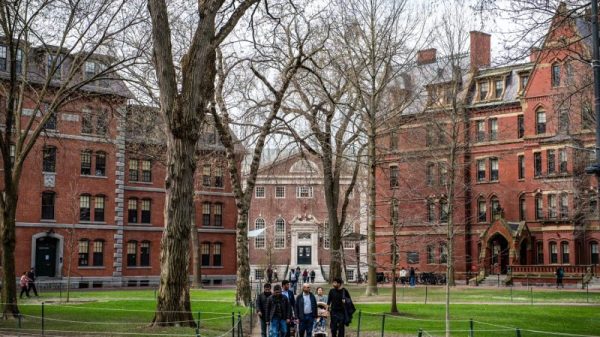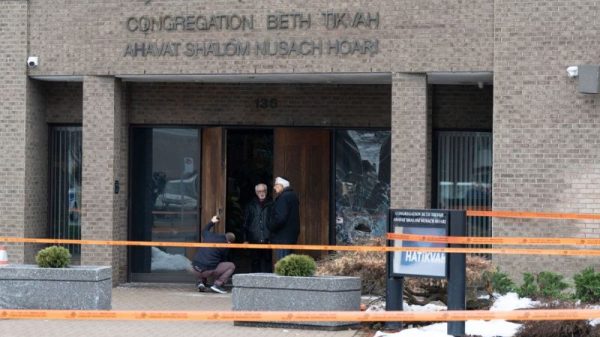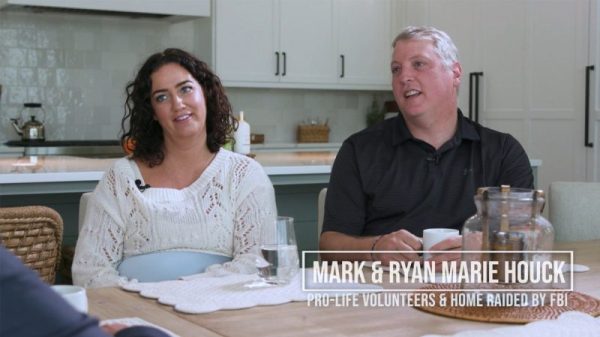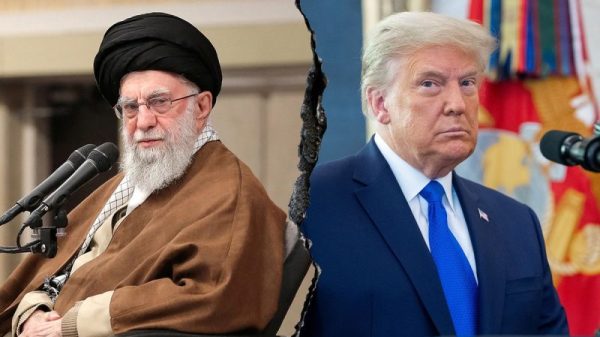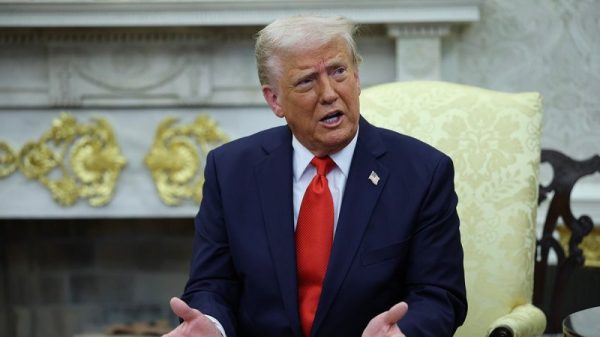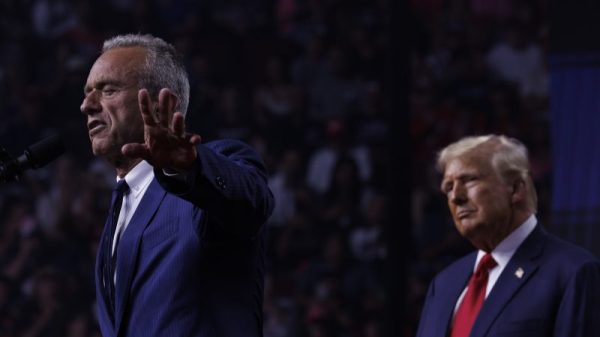
SAN ANTONIO — Leticia Sanchez was a church deaconess, teacher’s aide and an activist in her majority-Latino community helping register people to vote before she was arrested in 2018 for the first time in her life.
Texas Attorney General Ken Paxton (R) accused her and three other Hispanic women of forming an “organized voter fraud ring” that targeted elderly voters by applying for mail-in ballots they had not requested.
Five years later, the case was dismissed after the state’s highest criminal court ruled Paxton didn’t have the authority to prosecute Sanchez. But even with her record cleared, the cost of being branded a felon was enormous.
“It’s been difficult to move forward,” Sanchez, 63, said in her first interview since the arrest. “We didn’t do anything wrong. We were just helping people.”
The church leader’s case fits a pattern that has emerged in Texas under Paxton: Aggressive prosecutions for alleged election fraud crimes that upend lives but result in few cases that go to trial and end in a conviction. The Republican attorney general and his supporters believe election fraud is rampant, and point to the large number of charges filed as proof. Yet many of those charged have stories like Sanchez’s.
Civil rights groups say the charges tend to target Black or Latino voters and volunteers, many of whom are Democrats. The result has been a chilling effect on volunteers and community groups that for decades have worked to increase turnout in a state with one of the nation’s lowest voter participation rates. Critics say the charges are part of a wider effort by predominantly White, Republican state lawmakers to suppress votes in some of the fastest-growing parts of the majority-minority state: urban and suburban communities that lean Democrat.
“The goal isn’t to get a conviction,” said Chad Dunn, legal director of the UCLA Voting Rights Project, who has defended Texan clients against election-fraud claims and won a 2021 case that curbed the attorney general’s prosecutorial power. “It’s to set up a climate of fear around voting. He uses these witch hunts to gain attention and money.”
Paxton’s work in combating alleged voter fraud is back in focus after a recent spate of state raids on the homes of South Texas “abuelitas,” or older women known for their community work. One of the nation’s largest Latino civil rights organizations has called on the Justice Department to investigate. The department confirmed they are aware of the matter but declined to comment further.
Critics, both Democrats and Republicans, said they have become accustomed to the election season rollout: After a contested race result, the attorney general’s election police announce an investigation. Indictments and raids are timed to the run-up to early voting in the next election. And new, inexperienced voters and volunteers are scared off.
The attorney general’s office did not respond to multiple requests for comment on Paxton’s efforts to prosecute alleged voter fraud to date. Republican Gov. Greg Abbott’s office also did not comment.
“There is nothing more important than the integrity of our elections,” Paxton said in a recent announcement in which he touted a new “illegal voting” tip line. “Any attempt to illegally cancel out legal ballots with fraud, vote harvesting, or other methods will be met with the full force of the law.”
Paxton’s supporters say the election integrity unit’s work has been hamstrung by the court ruling three years ago that determined the attorney general cannot unilaterally prosecute election fraud cases. Republican state Sen. Paul Bettencourt, a Paxton ally, rejected the idea that the unit has been used for political playback, saying investigators are targeting long-problematic parts of the state.
“There has been a history in South Texas of election corruption and official corruption,” said Bettencourt, who represents the Houston area. “This is just an extension of that.”
‘Lives turned upside down’
Latino residents in Fort Worth’s Northside knew Sanchez well. The naturalized U.S. citizen born in Mexico was a trusted community member who helped Spanish-speaking seniors with things like getting food and medicine. She also worked through her Lutheran church to help people fighting substance abuse.
But Sanchez said she felt her community was disempowered, and that much of that had to do with the lack of Hispanic representation in local government. So she said she got certified to help register people to vote and also learned about the process to request mail-in ballots.
“They didn’t believe they could effect change,” Sanchez said of Latino residents in Fort Worth. “They needed more information about the value of their vote and lived in fear. I wanted to help break that fear.”
Working with other leaders, Sanchez registered hundreds to vote and helped elect Hispanic leaders for local office. But those elections raised the suspicion of a Republican activist, Aaron Harris, who began interviewing seniors and concluded Sanchez was illegally collecting absentee ballots, court records show. He alleged she formed part of a “Mexican mafia” scheme to help certain candidates starting in 2014. Those candidates were largely Democrats of Hispanic descent, some of whom were successfully elected.
Harris declined to offer further information on how he reached that conclusion when contacted by The Washington Post, saying only that “the evidence is pretty clear” and then insulting the reporter who asked the question.
Harris sent a full accounting of his investigation to Paxton’s office. They dove in. Investigators surveilled Sanchez, obtained warrants to search her home and finally, handcuffed her at her job. Prosecutors charged her with one count of illegal voting and 16 counts of providing false information on an application for a mail-in ballot. Sanchez’s daughter was also charged in the sting.
The mug shots of Sanchez, her daughter and two others were plastered on local and conservative media. Her arrest was cited in reports for congressional Republicans and conservative think tanks.
Sanchez’s attorney, Greg Westfall, said his client doesn’t dispute helping voters request mail-in ballots, but that she never filled out the form or submitted one on behalf of someone else. Texas law states that voters over the age of 65 — like the ones Sanchez volunteered to help — can request a mail-in ballot and if someone assisted them, that should be noted on the application.
Sanchez’s attorney said she followed that protocol.
“What she did was perfectly legal,” Westfall said. “It would’ve been a problem if she told them how to vote.”
Harris and state investigators, who did not speak Spanish, based their accusations on interviews with elderly Latinos who barely spoke English, according to Westfall, who listened to recordings of the interrogations.
Over the next five years, the case stalled. The coronavirus pandemic hit, slowing prosecutions. The attorney general’s office failed to show up twice to court, Westfall said, and there was only one hearing. The judge in the case was waiting for a ruling from a court of appeals on Paxton’s prosecutorial authority.
“Real people’s lives are turned upside down by a police officer showing up at their home, taking their phones and searching their space,” said Dunn, who brought the case challenging Paxton’s authority. “And that is the not the kind of despotic behavior that is envisioned in the credo of Texas freedom.”
That ruling came in 2021, when Texas’s Court of Criminal Appeals ruled Paxton could not prosecute election fraud cases without a referral or consent of a local prosecutor. The court ruled that a decades-old law giving the attorney general powers to prosecute election crimes was unconstitutional. They reaffirmed that decision in 2022.
As a result of the ruling, Sanchez’s case was dismissed.
For Sanchez and others who were charged with crimes, only to later see them dismissed, much has been lost: six-figure fortunes, dream homes and for some, faith in their adopted country. The deaconess was fired from her school job. Her grandchildren were bullied. Friends and family kept their distance.
Prayer was her only salve.
Chilling effect
Though Texas attorneys general have long gone after election fraud, state leaders have ramped up their efforts since former president Donald Trump falsely claimed the 2020 election was stolen.
Paxton led a lawsuit that unsuccessfully sought to throw out election results in four battleground states. And in 2021, state legislators passed a sweeping bill that eliminated practices like drive-through and overnight voting that had helped draw more Black and Latino voters to the polls.
Community leaders say the law has had a negative impact on nonprofit groups that have long worked to help get disadvantaged voters to the polls. Tania Chavez Camacho, the executive director of La Unión del Pueblo Entero (LUPE), a civil rights group, said her organization has turned away members looking for help with their ballots. They also no longer drive people to the polls.
“We have seen a drop off in volunteers for voting events,” she said. “I think that is a real threat to democracy.”
When there is fraud in Texas, experts said, the cases rarely impact the outcome of elections or provide evidence of massive organized efforts to overturn them. Often, they say, it’s the result of a mistake or misunderstanding about complicated laws.
Crystal Mason’s years-long prison sentence was overturned earlier this year after she said she made an honest mistake when she filled out a provisional ballot in 2016 while on supervised release for felony tax fraud. A person with a felony conviction can only vote in Texas if they have finished serving their sentence.
Mason’s vote was never counted. Still, the local prosecutor charged her with illegal voting and is asking the state’s criminal appeals court to reinstate her sentence.
Paxton’s election integrity unit opened at least 169 cases of alleged voter fraud that appear to have resulted in just one judgment since 2016, according to records they released in response to a request from the nonprofit watchdog group American Oversight. The rest of the cases were closed due to, among other things, insufficient evidence or prosecutors declining to pursue them. It is unclear how Paxton’s office defines a “judgment,” and they did not respond to a request to explain the records.
Other records obtained by American Oversight indicate at least 20 individuals pleaded guilty or were found guilty in trial up until 2021, when a court ruling limited the attorney general’s powers. Another 54 entered diversionary programs to avoid trial. Those numbers represent a minuscule fraction of the state’s 17 million registered voters.
The election fraud unit’s work has slowed since the 2021 ruling, but Paxton has continued filing charges, most recently touting a series of electioneering cases brought against school officials. He said in a statement the cases were filed in civil rather than criminal court because he was constrained by the 2021 ruling.
Paxton, members of his office and his supporters often cite the unusual metric of how many charges they have brought forward — rather than the number of successful convictions — to prove that the election unit is having success.
In an interview with Tucker Carlson nearly a year ago, Paxton derided the court of criminal appeals ruling that barred his office from pursuing voter-fraud cases unilaterally. He accused district attorneys in the state’s largest cities, all Democrat strongholds, of being “controlled” by Democrat donor George Soros and unwilling to pursue voter-fraud cases.
“They are not going to prosecute. We were doing it. We had 900 cases. So this whole idea that there’s no voter fraud? Complete fabrication,” Paxton said.
Right-wing Texas groups that complain of voter fraud praise Paxton’s efforts.
“Every bit helps in increasing awareness and decreasing the occurrences of fraud,” Julie McCarty, founder of True Texas Project, a tea party group, said of Paxton’s election integrity unit, adding that Paxton has been “on fire” this year.
An ACLU of Texas analysis of prosecutions by Paxton’s election integrity unit shows the targets of election fraud investigations tended to be people of color, said Savannah Kumar, a staff attorney with the group.
“We know for individual voters who are simply trying to have their voices heard by participating in elections, these prosecutions can completely derail their lives,” Kumar said. “The incentives are just not there for people to have their voices heard and risk years in jail.”
A high price
Tomas Ramirez III, a Republican justice of the peace in Medina County, outside San Antonio, was among those charged in a February 2021 election fraud indictment. Three older Hispanic women who volunteered for his campaign were also charged. Together they were accused of about 250 offenses. The state levied 35 felony counts against Ramirez that could have imprisoned him for life.
An experienced trial attorney, Ramirez said the charges were illogical. Investigators, he said, alleged he illegally possessed about 17 suspicious absentee ballots. They traced the ballots to a facility in Devine, Tex., where Ramirez had visited once during his 2018 primary campaign and given people there his business card. Then he left. Ramirez prevailed in defeating the incumbent.
“There was absolutely nothing and they brought the charges anyway. They never presented evidence,” said Ramirez, whose case was dismissed in three different courts after 18 months. “It caused all kinds of grief for my family.”
The stress and humiliation weighed on him in both tangible and unexpected ways. Ramirez spent tens of thousands of dollars on his defense. Business at his law practice slowed and bottles were thrown at his door. He was suspended from the bench. His wife and children came home to anonymous hate mail.
Ramirez described himself as “conservative an individual as you’ll run across in Texas” and believes voter fraud exists. He hosts a weekly Bible study class on YouTube, wrote a book on biblical fundamentals for fellow Christians and fits the profile of the type of voter the attorney general considers part of his base.
“All I know is I don’t like the way they handled my case,” he said. “And if they are handling my case in the same way they handled the others, that’s not right.”
Mary Jane Balderrama is a longtime community leader in South Texas and canvassed for Ramirez, who is a friend. The then 73-year-old was on a birthday trip when she received a call from Paxton’s office saying they had a warrant for her arrest. Balderrama said she thought it was a birthday prank. The stern voice on the line assured her it wasn’t.
Balderrama was a state social worker for years and visited the Bandera County jail frequently as a missionary to pray with inmates. Now it was she on the other side as police took her fingerprints.
“It was a horrible experience,” said the now-76-year-old, who leans Republican but has voted for Democrats in the past.
What followed was months of near-nervous-breakdown, visits to the neurologist to stave off facial paralysis brought on by stress, nightmares and the loss of a dream retirement condo overlooking a golf course.
The case was dismissed in 2022. Ramirez, with Balderrama’s help, won reelection that year by far more votes than the race that put him on the attorney general’s radar.
For Sanchez, the church deaconess, hearing about other Latinos being charged with election fraud triggers flashbacks. Details from the day Sanchez’s home was searched come back. One officer took a blood sample from her without explaining why. Another asked for alcohol when she offered the officers a refreshment.
She said the only thing that got her through those days was her faith.
“I prayed to God because this was all beyond my strength,” she said. “I had to believe that the truth would be revealed.”



















